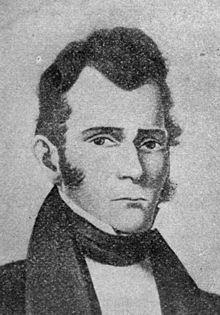John Tipton
John Shields Tipton (born August 14, 1786 in Sevierville , now Tennessee , † April 5, 1839 in Logansport , Indiana ) was an American army officer and politician ( Democratic Party ). He represented the state of Indiana in the US Senate .
Tipton, born in what is now Sevier County , lost his father at an early age, who was killed by the Indians . His great-uncle, who was also called John Tipton, was one of the prominent figures in the area, which is why he was at times the target of actions by supporters of a State of Franklin that was independent of Tennessee .
When he was 17 years old, John Tipton moved to Harrison County , Indiana . There he married Martha Shields in 1806; the marriage was divorced in 1816. He worked as a farmer in his new home and joined a militia that was supposed to protect him and other settlers from Indian attacks. During the Battle of Tippecanoe he commanded the Yellow Jackets company ; later the Indiana Rangers were under his command in the British-American War . At this point, Tipton held the rank of major . After the peace agreement, he was promoted to brigadier general.
As a result, Tipton embarked on a political career. He was a member of the Indiana House of Representatives from 1819 to 1823 ; During this time he founded the present-day city of Columbus , which was originally called Tiptonia . He was a member of commissions that discussed the new state capital and participated in the settlement of border disputes between Indiana and Illinois . In 1823 he became a United States Indian agent and in this capacity led official negotiations with the tribes of the Potawatomi and the Miami . When the talks with the Potawatomi were unsuccessful, Tipton initiated their forcible relocation to what is now Kansas ; the action that killed more than 40 Indians came to be known as the Potawatomi Trail of Death .
Tipton, who married a second time in 1825, was elected in 1831 by the Indiana General Assembly to succeed the late US Senator James Noble ; In the meantime, Robert Hanna had temporarily fulfilled his mandate. On December 9, 1831, Tipton moved into the Senate, where he remained until March 3, 1839 after being re-elected the following year. During this time he was chairman of the Committee on Roads and Canals and the Committee on Indian Affairs . For health reasons, he decided not to run again; two weeks after leaving the Senate, he died in Logansport, a town he helped found. The Tipton County in Indiana and its administrative headquarters Tipton are named after John Tipton.
Web links
- John Tipton in the Biographical Directory of the United States Congress (English)
- John Tipton in the database of Find a Grave (English)
| personal data | |
|---|---|
| SURNAME | Tipton, John |
| ALTERNATIVE NAMES | Tipton, John Shields (full name) |
| BRIEF DESCRIPTION | American politician |
| DATE OF BIRTH | August 14, 1786 |
| PLACE OF BIRTH | near Sevierville , Tennessee |
| DATE OF DEATH | April 5, 1839 |
| Place of death | Logansport , Indiana |

